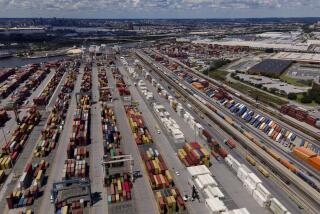Behind Base-Closure Figures: Families, Hopes and Dreams : Shipyard: For thousands of South Carolina workers, days are spent going to work and nights sending out resumes. Many hope to land jobs well before gates close.
- Share via
CHARLESTON, S.C. — Dave Jordan has trouble sleeping at night. Marsia Butler worries what will become of her fellow workers. Dan and Meg Holcomb have put their plans to have babies on hold.
Behind the grim statistic that the closing of the Charleston Navy base and shipyard will cost 40,000 jobs are the hopes, dreams and fears of the people who must build a new future without the military.
“I don’t think I’ve slept well in the last couple of months. My temper has been short lately, and I know why,” said Jordan, who after 16 years will lose his job as a nuclear engineering technician. “There’s a lot of bitterness over what has happened.”
For Jordan and thousands like him, days are spent going to work and nights sending out resumes. Many people are hoping to land jobs well before the shipyard gates close for good in about three years.
At 45, Jordan doesn’t have enough government service to retire. He worries about finding another federal job as government priority placement lists swell.
“You don’t have anything to look forward to other than going to school,” said Butler, 46, who works in the shipyard outplacement office helping others map their futures. She will have to find a new one for herself as well.
The Holcombs married almost three years ago and thought they would make Charleston their permanent home. Now they’re looking to move anywhere that Dan, a 29-year-old engineer, can get a steady paycheck.
Here are their stories.
*
Dave Jordan wanted to retire in Charleston. But that’s yesterday’s dream.
“I’m not a young man. I’m too old to start changing careers,” he said as he sat with his wife, Linda, surrounded by family pictures in the couple’s ranch home in suburban Summerville.
Linda Jordan, also 45, has worked for 13 years at the Naval Engineering Center, which will remain open. But Jordan, who makes $42,000 annually, is the main breadwinner. If he loses his job, the family moves. Perhaps to Kings Bay, Ga. Perhaps to Norfolk, Va. Anywhere Jordan can get a few more years’ federal service.
There’s now a deep distrust of the Navy. “There is a fear the Navy will come after us again in 1995,” Linda Jordan said, referring to the engineering center.
Her husband has resumes out, but there are nagging questions.
“Do I look for a job now or do I wait until the end and get two more years in?” Jordan wondered. “Are you the first out or the last out? Which is better?”
The Jordans have two sons. The older one, 23-year-old Brian, works for an area grocery chain, and his family fears even his job isn’t safe.
“The ripple effect,” Jordan said, “is going to affect the entire economy.”
*
Marsia Butler spends her days in a nondescript brick building outside the shipyard gate, but her future is uncertain. She knows one thing: She plans to stay in Charleston. It is where she grew up.
The government has promised millions of dollars to the city for retraining workers, but Butler worries there won’t be enough to help everyone.
“We’re going to have some hurt,” she said. “Charleston is going to be hit hard. We need some more industry. There is just nothing to look forward to.”
Already, she’s been watching her pennies, as the other shipyard workers are, even though it will be three years until the yard shuts its gates.
“People are making plans and paying off their bills. You try to pay off everything you have,” she said.
Butler, who has been with the government for 23 years, plans to train for another job. She says she’ll probably remain at the yard until it closes. Then she hopes to begin another career--perhaps as a paralegal, perhaps in computers.
“I want to stay in Charleston,” she said. “Where else would I go?”
*
Dan and Meg Holcomb signed a contract to build their $100,000 house in a shady subdivision in suburban Mt. Pleasant last summer. They moved in last February. Three weeks later, the Navy announced the shipyard was closing.
“We were speculating they might cut back at the yard. But the closure was a complete surprise,” Holcomb said.
Now he faces finding another job and selling the house when thousands may be leaving the area. “I don’t want to have the point of view of the shipyard closing from the inside,” he said.
There’s not a lot of call for engineers in Charleston and the few openings attract dozens of applications, said Holcomb, who has circulated resumes for several months with little luck.
“Last summer, when we started our house, we wanted to make Charleston our home,” said Meg Holcomb, 28, who works for a real estate attorney. “We’d like to be here and have great jobs and babies right here in this house. Now there isn’t anywhere we wouldn’t move.”
Holcomb said it’s likely they’ll end up in upstate South Carolina or Georgia, where there are more industries needing engineers.
“Dan is good and has patience. I want to know what the future will be,” Meg Holcomb said. “The hardest thing is the uncertainty, like the past few months. That’s all we think about--is Dan going to get a job?”
More to Read
Inside the business of entertainment
The Wide Shot brings you news, analysis and insights on everything from streaming wars to production — and what it all means for the future.
You may occasionally receive promotional content from the Los Angeles Times.










